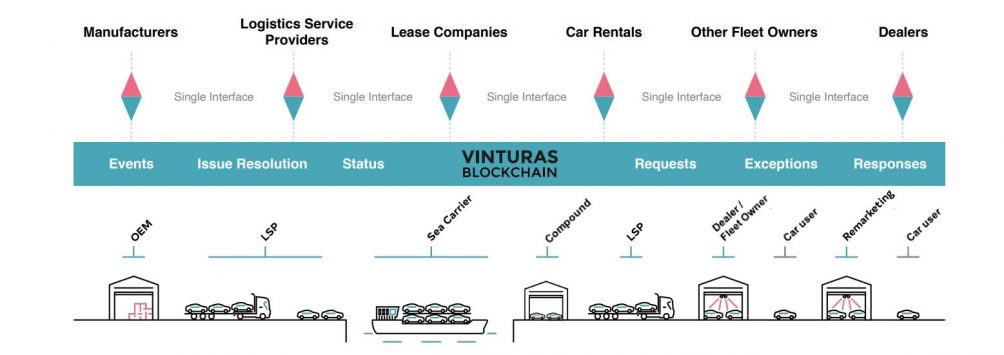
Things are moving in the right direction for Vinturas, the start-up from Groningen that offers a digital platform based on blockchain technology. With it, the entire supply chain of cars, trucks and other vehicles can be tracked from start to finish. And all this was accomplished while the automotive industry reached its nadir during the corona pandemic. “By now, we have developed and tested our technology. Now it’s time to conquer the market,” says CEO of Vinturas Ronald Kleijwegt. He answered five questions about how the company is doing.
Spreadsheets, e-mails and paperwork: the supply chain of cars, trucks, farming equipment and other vehicles cannot exactly be called modern. When shipping by sea and road, the various parties in the supply chain therefore have little idea of where their vehicles are and whether they are delayed. The digital platform of Vinturas, based in Groningen, Netherlands, ensures that automotive brands and logistics service providers can easily track the vehicles at a glance and, where necessary, take action to deliver vehicles on time.

How exactly does a digital platform based on blockchain technology work?
“When using our digital platform, all parties are connected. The main parties, such as commercial customers, manufacturers and service providers for manufacturers determine what data can be shared with whom. Each update is encrypted directly in the blockchain and cannot be changed. Documentation and photos during transport can also be shared. This creates enormous efficiency, as each transaction only needs to be done once. The location of a vehicle is also known at any time. It is possible to look back to determine where in the route, for example, any damage occurred. The platform is a ‘cloud’ solution, so no matter where one is or logs in, the information is immediately available. This also applies to, for example, drivers in the post-transport. They, too, can receive information directly via an app and they can also share information regarding, for example, the delivery of a vehicle.”
What are the advantages in moving from “old-fashioned” systems such as Excel to the new platform?
“Traditional interfaces are often focused on two parties. With blockchain technology, information is shared with everyone at the same time. Think of large parties, but also the smallest carrier who only owns a single truck. There is a total overview of the entire chain through which the means of transport passes. The transfer of information is also much more secure. This is important because cybercrime is very common. There have been many issues where big companies like Maersk, TNT and others were shut down by a cyberattack. With our blockchain technology, the information is well encrypted.”
“Because the location and arrival times of the vehicles are more visible, it is also possible to anticipate future scenarios. If a ship arrives late at the port; the parties know about it in time. They can then determine alternative routes and plan capacity proactively. In that case, for example, a logistics company can come and collect a number of cars with trucks instead of having them loaded onto the next ship. That in turn saves time.”

How far along are you with the development of the platform?
“For the past three years, we have been busy developing and testing our product. We are now ready to take it to the market. That’s what we’ve been focusing on for the past three months. We have also conducted several pilots, including one in which cars were shipped from China to Scandinavia. This involved various loading moments, so we were able to test our system thoroughly. In the past three months, we handled the first 80,000 vehicles and more than 500,000 transactions through our blockchain platform. We are already working with, among others, five logistics service providers, such as Koopman Logistics from Groningen, Groupe CAT in France and Axess from Sweden. Before the end of the year, we are going to do a first pilot for a large car manufacturer.”
Can the platform also be used in other sectors besides the automotive industry?
“Yes, definitely. I myself have a background in container transport and our platform can be just as useful there. It will also work in other sectors, such as the food industry or oil and gas transportation. All these industries need visibility and safe, reliable data, because every kilometer that a truck unnecessarily spends on the road costs a lot of money. With our new technology, there really are a lot of savings possible.”
Do you think blockchain technology is the future when it comes to the automotive supply chain, and also in other sectors?
“Indeed, I think it will eventually replace current technologies. First, everything was written down with pen and paper, then came products like Excel, and I predict that blockchain is going to be the next step and will replace traditional ‘user interfaces.’ I do notice that people still shy away from the new technology because they are not yet familiar with it. That also happened with the arrival of the Internet, for example. So we are also focusing on educating people about blockchain. We make videos, for example, in which we explain in a simple way exactly how it all works. There is still a lot of profit to be made there. But ultimately, there are too many advantages to the system not to use it.”
Read other IO articles about Groningen here

